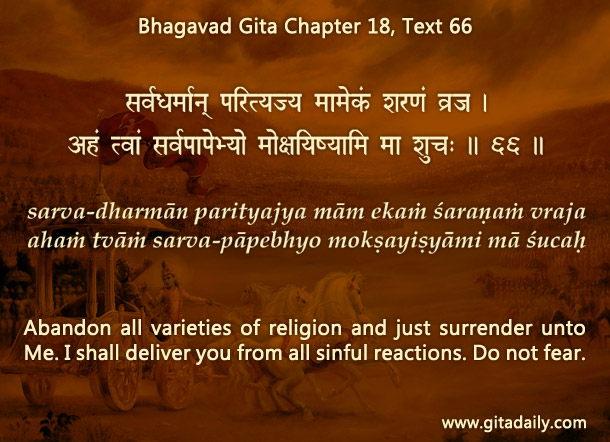The Bhagavad-gita concludes with a call for Arjuna to surrender (18.66) — such surrender is underscored to be a central component of bhakti-yoga. Is the Gita’s endorsement of bhakti-yoga meant specifically for Arjuna or universally for all Gita students?
The Gita seamlessly integrates the universal and the specific. It doesn’t contain any demarcation points that label certain sections as universal and others as specific for Arjuna. In fact, the Gita’s blending of the specific and the universal is seen right from its beginning (02.07). Though Arjuna faces a specific ethical dilemma, he asks a universal question: what is dharma, the right thing to do? He doesn’t ask: what is my dharma, the right thing to do for me?
But doesn’t the Gita’s conclusion feature Krishna’s intimate and emphatic declaration of love (18.64-65) that applies specifically, even solely, to Arjuna? Not exactly. Yes, that declaration is certainly meant for Arjuna, with whom Krishna has a special loving relationship described in the Mahabharata. And yes, the fraternal mood of love that animates the Krishna-Arjuna relationship may not apply to us. Nonetheless, the underlying principle of love applies to all divine-human relationships. After all, the Gita indicates that Krishna desires a loving relationship with everyone; we all are his children (14.04) and he is everyone’s well-wisher (05.29).
If the Gita’s conclusion doesn’t seem applicable to us, that’s not because Krishna doesn’t love us; that’s only because we don’t love Krishna, at least not at present. But the Gita’s purpose is to change that state of affairs by inspiring us all to redirect our heart toward Krishna.
One-sentence summary:
The Bhagavad-gita’s entire message is both specific and universal; the only difference is that the specific — Arjuna — richly manifests the fulfilled potential for divine love that is universally present but largely latent in every heart.
Think it over:
- How is the Gita’s seamless blending of the universal and the specific seen right from its beginning?
- In what sense does the Gita’s conclusion apply specifically to Arjuna?
- In what sense does the Gita’s conclusion apply to all of us?
***
18.66: Abandon all varieties of religion and just surrender unto Me. I shall deliver you from all sinful reactions. Do not fear.
To know more about this verse, please click on the image


Leave A Comment